
All Related Articles

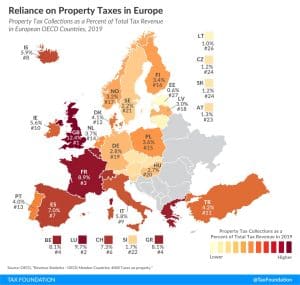
Reliance on Property Taxes in Europe
Property taxes are levied on the assets of an individual or business. There are different types of property taxes, with recurrent taxes on immovable property (such as property taxes on land and buildings) the only ones levied by all countries covered. Other types of property taxes include estate, inheritance, and gift taxes, net wealth taxes, and taxes on financial and capital transactions.
1 min read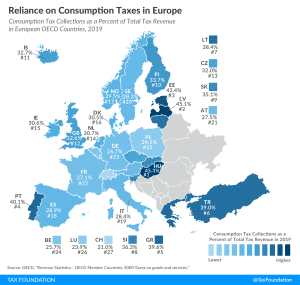
Reliance on Consumption Taxes in Europe
Hungary relies the most on consumption tax revenue, at 45.3 percent of total tax revenue, followed by Latvia and Estonia at 45.1 percent and 42.4 percent, respectively.
2 min read
Can GILTI and the GloBE be Harmonized in a Biden Administration?
While there are several parts of the policy that are subject to further discussion and agreement, GloBE is expected to be different from GILTI in several ways.
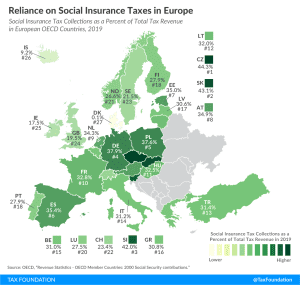
Reliance on Social Insurance Tax Revenue in Europe
Social insurance taxes are the second largest tax revenue source in European OECD countries, at an average of 29.5 percent of total tax revenue.
2 min read
Evaluating Proposals to Increase the Corporate Tax Rate and Levy a Minimum Tax on Corporate Book Income
President Biden and congressional policymakers have proposed several changes to the corporate income tax, including raising the rate from 21 percent to 28 percent and imposing a 15 percent minimum tax on the book income of large corporations, to raise revenue for new spending programs. Our new modeling analyzes the economic, revenue, and distributional impact of these proposals.
46 min read
Changes to the Tax Base Matter When Evaluating the Impact of Tax Reforms
A new study illustrates how overlooking an important element of the tax system—the structure of the tax base—can lead to an incomplete understanding of how tax reform impacts the economy.
4 min read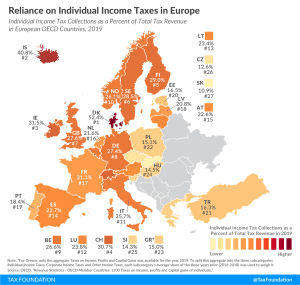
Reliance on Individual Income Tax Revenue in Europe
Denmark relies the most on revenue from individual income taxes, at 52.4 percent of total tax revenue, followed by Iceland and Ireland at 40.8 percent and 31.5 percent, respectively.
1 min read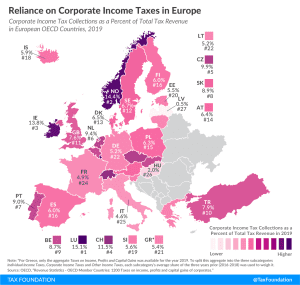
Reliance on Corporate Income Tax Revenue in Europe
Despite declining corporate income tax rates over the last 30 years in Europe (and other parts of the world), average revenue from corporate income taxes as a share of total tax revenue has not changed significantly compared to 1990.
1 min read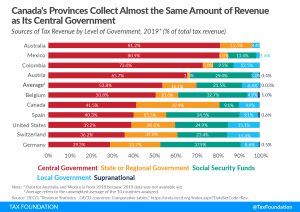
Sources of Government Revenue in the OECD, 2021
Developed countries have on average become more reliant on consumption taxes and less reliant on individual income taxes. These policy changes matter, considering that consumption-based taxes raise revenue with less distortionary effects than taxes on income.
16 min read
Personnel Is Policy: Biden International Tax Team Edition
This week, the Treasury Department added several new appointees as staffing continues following President Biden’s inauguration. Among them were three scholars of international tax policy: economist Kimberly Clausing and law professors Rebecca Kysar and Itai Grinberg. These three will be influential in developing the administration’s approach to changing U.S. tax rules for multinational corporations and negotiating international tax policy changes at the Organisation for Economic Co-operation and Development (OECD).
4 min read
The European Commission and the Taxation of the Digital Economy
The consultation on the EU’s digital levy provides an opportunity for policymakers and taxpayers to reflect on the underlying issues of digital taxation and potential consequences from a digital levy. Unless the EU digital levy is designed with an OECD agreement in mind, it is likely to cause more uncertainty in cross-border tax policy.
12 min read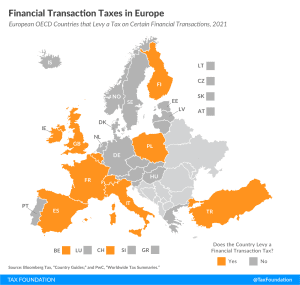
Financial Transaction Taxes in Europe
Belgium, Finland, France, Ireland, Italy, Poland, Spain, Switzerland, Turkey, and the United Kingdom currently levy a type of financial transaction tax
2 min read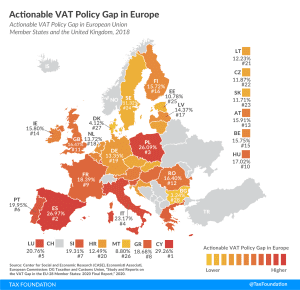
Actionable VAT Policy Gap in Europe, 2021
Value-added taxes (VAT) make up approximately one-fifth of total tax revenues in Europe. However, European countries differ significantly in how efficiently they raise VAT revenues. One way to measure a country’s VAT efficiency is the VAT Gap.
4 min read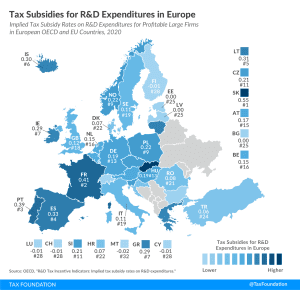
Tax Subsidies for R&D Expenditures in Europe, 2021
Many countries incentivize business investment in research and development (R&D), intending to foster innovation. A common approach is to provide direct government funding for R&D activity. However, a significant number of jurisdictions also offer R&D tax incentives.
4 min read
Day 2 of OECD Consultation on International Tax Reform Blueprints
The OECD consultation is in the context of the Inclusive Framework on Base Erosion and Profit Shifting which is made up of delegates from more than 135 countries and is focused on policies that reduce opportunities for tax avoidance by multinational companies. The current proposals being considered would change both where and how much companies pay in corporate taxes.
4 min read
Day 1 of OECD Consultation on International Tax Reform Blueprints
The first session was focused on Pillar 1 of the OECD proposal. The pieces in Pillar 1 would change tax rules so that companies would be paying more taxes in countries based on the location of customers. This approach would move more tax revenues into so-called “market countries.”
3 min read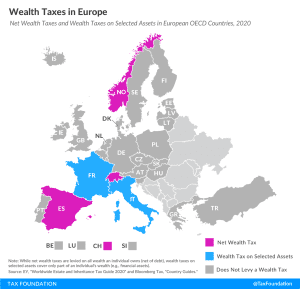
Wealth Taxes in Europe, 2020
Net wealth taxes are recurrent taxes on an individual’s wealth, net of debt. The concept of a net wealth tax is similar to a real property tax. But instead of only taxing real estate, it covers all wealth an individual owns. As today’s map shows, only three European countries covered levy a net wealth tax, namely Norway, Spain, and Switzerland. France and Italy levy wealth taxes on selected assets but not on an individual’s net wealth per se.
3 min read
A Framework for the Future: Reforming the UK Tax System
Our new guide identifies key areas for improvement in UK tax policy and provides recommendations that would support long-term growth without putting a dent in government revenues.
24 min read
Details and Analysis of President Joe Biden’s Campaign Tax Plan
What has President Joe Biden proposed in terms of tax policy changes? Our experts provide the details and analyze the potential economic, revenue, and distributional impacts.
23 min read